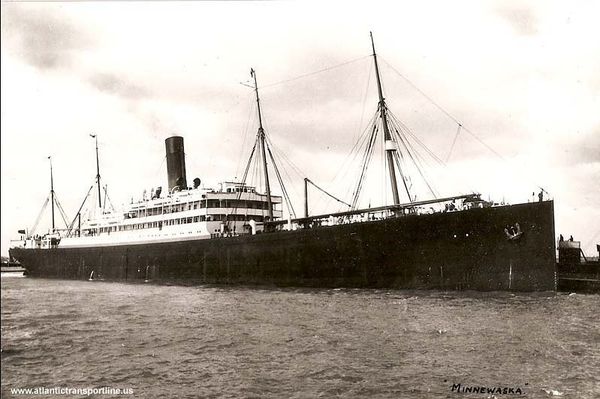Difference between revisions of "HMT Minnewaska"
From Our Contribution
(Created page with "{{Infobox | name = HMT Minnewaska | title = HMT Minnewaska | above = | subheader = | image = File:HMT_Minnewaska.jpg | captio...") |
|||
| Line 6: | Line 6: | ||
| subheader = | | subheader = | ||
| − | | image = [[File:HMT_Minnewaska.jpg]] | + | | image = [[File:HMT_Minnewaska.jpg|600px]] |
| caption = | | caption = | ||
| image2 = | | image2 = | ||
Revision as of 17:08, 6 February 2018
 | |
| History | |
|---|---|
| Name | HMT Minnewaska |
| Builder/Built | 1908 Harland & Wolff, Belfast |
| Type | twin screw passenger and cargo ship |
| Displacement | 14,317 tons |
| Speed | 16 knots |
Remarks
Built for and owned by The Atlantic Transport Line, and operated on the Transatlantic route.
In January 1915 she was requisitioned to serve as a British Army troop transport. The Minnewaska (III) sailed from Avonmouth on Friday March 5, 1915, bound for Alexandria, which she reached early in the evening on Sunday, March 14. She sailed next for Gallipoli on April 18, with the headquarters of the 1st Australian division and many troops on board. A number of officer's horses were also shipped to the Gallipoli Peninsula but were not landed.
The Minnewaska (III) was present at the Gallipoli landings and was involved in a minor collision with Derfflinger off Anzac Cove on April 28.
The Minnewaska (III), was defensively armed with a gun mounted on her stern, and made five voyages ferrying troops and artillery to the Dardanelles. She had some narrow escapes but on November 29, 1916, she finally struck a floating mine in Suda Bay, Crete, en route to Saloniki. She was transporting 1,600 troops on this occasion and had a crew of 200. She took on a rapidly increasing list but Captain Gates decided to steam at full speed to the nearby shore and successfully ran her aground 50 yards west of Cape Deutero at the entrance to Suda Bay.
His actions saved many lives. It took about two hours to evacuate the ship and the men were rescued without loss by the trawler Danestone, the drifters Principal, Trustful and Deveronside, and the destroyer Grampus. But her bottom had been torn away by the mine and the Minnewaska (III) had to be abandoned on the beach where she lay.
In 1918 she was sold to shipbreakers for scrap and was broken up in situ. Parts of the wreck remain on site.